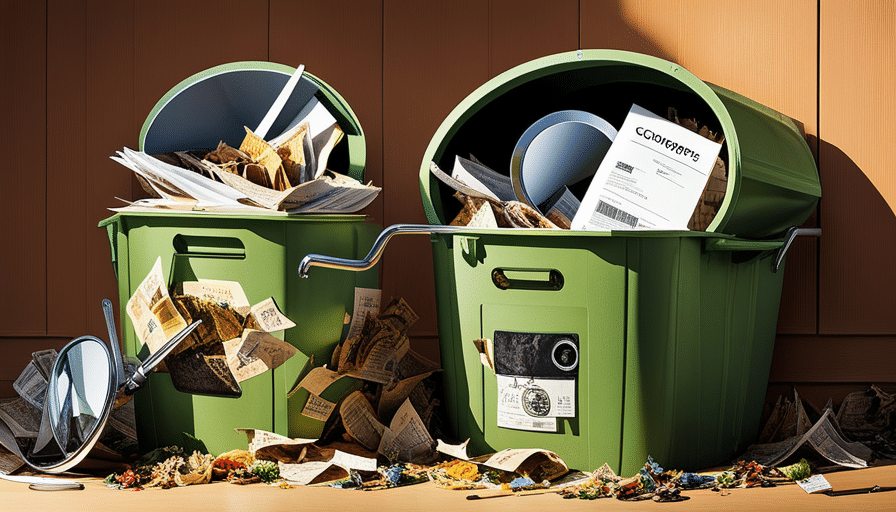Do you ever find yourself wondering what to do with all those receipts cluttering up your wallet or purse? You might be tempted to toss them in the compost bin, but is that really a good idea?
The answer isn’t as straightforward as you might think. First of all, it’s important to understand what receipts are made of. Many receipts are printed on thermal paper, which contains chemicals like bisphenol A (BPA) and bisphenol S (BPS).
Both of these chemicals have been linked to health and environmental problems, so it’s no surprise that people are concerned about whether they can compost receipts safely. In this article, we’ll take a closer look at the components of thermal paper and explore the potential risks associated with composting receipts.
Key Takeaways
- Receipts are often made of thermal paper containing chemicals like BPA and BPS, which make it difficult to compost them.
- Plastic-coated receipts contain BPA and can also contaminate other items like food or water.
- Opting for digital receipt options and keeping a small notebook or phone app can reduce paper waste and eliminate the need to compost receipts.
- Proper disposal of receipts should involve recycling or throwing them in the trash, but composting may not be a practical option due to the chemicals in thermal paper.
Understanding Thermal Paper and its Components
You can’t compost receipts because they’re typically made of thermal paper. This paper contains chemicals that harm the environment and your health, such as bisphenol A (BPA) or bisphenol S (BPS) that are coated on the surface layer of the paper. BPA is a known endocrine disruptor that affects human hormones, while BPS has been linked to developmental disorders.
Thermal paper also contains other chemicals, such as dyes and stabilizers, which make it difficult for receipts to decompose in landfills and release harmful substances into the soil. Therefore, it’s important to properly dispose of receipts by recycling them or throwing them in the trash instead of trying to compost them.
The Environmental and Health Impacts of BPA and BPS
BPA and BPS, chemicals commonly found in thermal paper used for receipts, have been linked to several health issues such as obesity and reproductive problems, according to a study by the Environmental Working Group.
These chemicals are known endocrine disruptors that can mimic hormones in our bodies, leading to hormone imbalances and other negative effects.
It’s important to be aware of the potential health risks associated with handling thermal paper receipts. Here are some things you can do to reduce your exposure:
-
Say no to receipts whenever possible.
-
Wash your hands after handling receipts.
-
Store your receipts separately from food items or anything else that may come into contact with them.
-
Look for BPA-free alternatives when purchasing products like water bottles or food storage containers.
The Problems with Plastic-Coated Receipts
Plastic-coated receipts are causing concern due to their negative impact on the environment and potential health risks. The coating on these receipts contains a chemical called Bisphenol A (BPA), which is known to disrupt hormones in the body. BPA can also leach out of the coating and contaminate other items, such as food or water.
To combat this issue, many businesses are starting to offer plastic-free alternatives for their receipts. These alternative options may include electronic receipts, paper receipts without coatings, or even reusable receipt books.
Additionally, some recycling options exist for plastic-coated receipts. However, it’s important to note that not all recycling facilities accept these types of materials, so it’s essential to do research before throwing them away.
Ultimately, making small changes like opting for plastic-free alternatives or properly disposing of plastic-coated receipts can have a significant positive impact on both our health and the environment.
Alternatives to Composting Receipts
Don’t let your good intentions go to waste – there are alternative solutions for disposing of those pesky bits of paper you receive with every purchase.
If composting receipts isn’t an option for you, consider paper waste reduction methods instead. One way to do this is by opting for digital receipt options whenever possible. Many retailers now offer the choice to receive digital receipts via email or text message, eliminating the need for a physical copy.
Another way to reduce paper waste is by keeping a small notebook or phone app handy to jot down purchases and amounts. This can serve as a personal record of transactions without accumulating unnecessary bits of paper.
By making small changes like these, you can significantly decrease your personal contribution to paper waste and help protect our environment for future generations.
Frequently Asked Questions
Why are some thermal paper receipts not compostable?
Ever wonder why some thermal paper receipts can’t be composted? It’s because they contain chemicals like BPA that are harmful to the environment. Look for alternatives to thermal paper, like soy ink and recycled paper, to reduce your impact when composting receipts.
Can composting receipts release harmful chemicals into the environment?
Composting receipts can release harmful chemicals into the environment, such as BPA and BPS. Alternatives to composting include recycling or disposing of them in the trash. Consider using digital receipts instead to reduce environmental impact.
Is it safe to handle receipts with BPA or BPS?
When handling receipts with BPA or BPS, there are potential health risks. Safe alternatives include opting for digital receipts or using gloves when handling paper ones.
Are there any health risks associated with composting receipts?
Before composting receipts, consider their environmental impact. They may contain toxic chemicals that harm soil and plants. Alternatives include recycling them or using digital options. Don’t let composting "burn a hole in your pocket".
Can composting receipts attract pests or rodents to the compost pile?
To prevent pests and rodents from being attracted to your compost pile, make sure to employ proper pest control methods and manage odors effectively. This applies to all materials, including receipts, which can be composted if they are not coated in chemicals.

